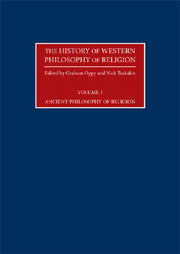Book contents
- Frontmatter
- Contents
- Editorial Introduction
- Contributors
- 1 Ancient Philosophy of Religion: An Introduction
- 2 Pythagoras
- 3 Xenophanes
- 4 Socrates and Plato
- 5 Aristotle
- 6 Epicurus
- 7 The Stoics
- 8 Cicero
- 9 Philo of Alexandria
- 10 The Apostle Paul
- 11 Plutarch of Chaeroneia
- 12 Sextus Empiricus
- 13 Early Christian Philosophers: Justin, Irenaeus, Clement of Alexandria, Tertullian
- 14 Origen
- 15 Plotinus
- 16 Porphyry and Iamblichus
- 17 The Cappadocians: Basil of Caesarea, Gregory of Nazianzus, Gregory of Nyssa
- 18 Augustine
- 19 Proclus
- 20 Pseudo-Dionysius
- Chronology
- Bibliography
- Index
13 - Early Christian Philosophers: Justin, Irenaeus, Clement of Alexandria, Tertullian
- Frontmatter
- Contents
- Editorial Introduction
- Contributors
- 1 Ancient Philosophy of Religion: An Introduction
- 2 Pythagoras
- 3 Xenophanes
- 4 Socrates and Plato
- 5 Aristotle
- 6 Epicurus
- 7 The Stoics
- 8 Cicero
- 9 Philo of Alexandria
- 10 The Apostle Paul
- 11 Plutarch of Chaeroneia
- 12 Sextus Empiricus
- 13 Early Christian Philosophers: Justin, Irenaeus, Clement of Alexandria, Tertullian
- 14 Origen
- 15 Plotinus
- 16 Porphyry and Iamblichus
- 17 The Cappadocians: Basil of Caesarea, Gregory of Nazianzus, Gregory of Nyssa
- 18 Augustine
- 19 Proclus
- 20 Pseudo-Dionysius
- Chronology
- Bibliography
- Index
Summary
The four writers who begin Christian philosophy in the second century are different in their origin and in their philosophical backgrounds. Justin, from Rome, is as much a Stoic as he is a Platonist. Irenaeus, from Lyons, is only a philosopher by fragmentary borrowing and such strong overall argument as caused Erasmus to name him ‘Irenaeus Philosophus’. Clement of Alexandria is plainly philosophical and frequently Platonist. Finally, Tertullian of Carthage, who criticized philosophy, is strongly Stoic. As Collingwood (1961) and Skinner (1969) insisted, there are no perennial problems in the history of ideas to which successive solutions are offered, but only problems that vary from thinker to thinker and from time to time.
JUSTIN
Justin was born in Nablus early in the second century, but came to Rome, where he taught as a philosopher. He tells how he moved from one philosophical school to another until he came to Platonism and beyond Plato to Christian faith (Dialogue with Trypho 2–8). In another place he insists that he became a Christian because he saw that Christians were “fearless in the face of death and all that men call fearful” (Second Apology 12.1). Justin is called an ‘apologist’ because he defends Christianity against four strong attacks: ridicule from philosophers, persecution by the state, attack from the Jews and strife with heretics. He enlarges the place of argument in Christian discourse.
- Type
- Chapter
- Information
- The History of Western Philosophy of Religion , pp. 187 - 198Publisher: Acumen PublishingPrint publication year: 2009



